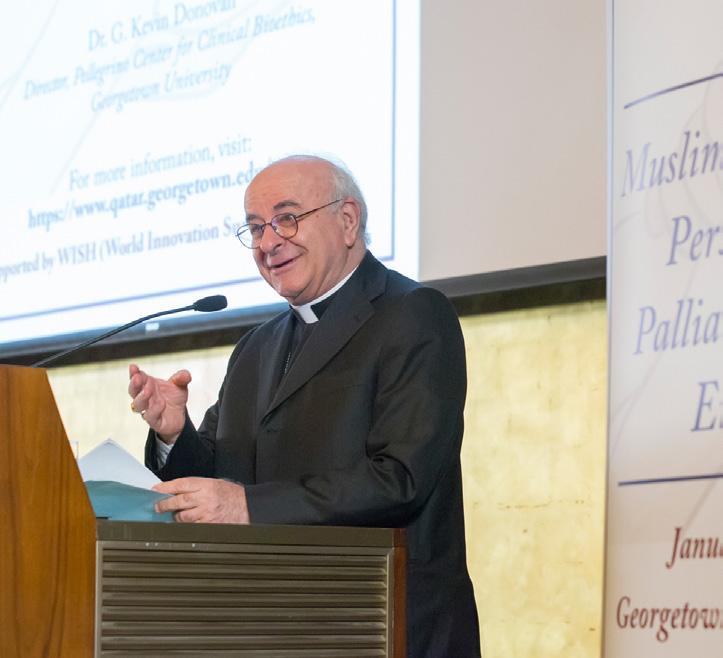
17 minute read
Faculty Research
GU-Q faculty research reflects a wide variety of academic interests and issues of concern to Qatar and the wider region. Faculty engaged in multiple research collaborations that led to conferences, symposia, colloquia, publications, and research grants in 2018-2019.
P a l l a t i v e C a r e & E n d o f L i f e C o n f e r e n c e
86
institutions represented by speakers or participants in working groups at GU-Q this year
15
institutional research collaborators
Archbishop Vincenzo Paglia
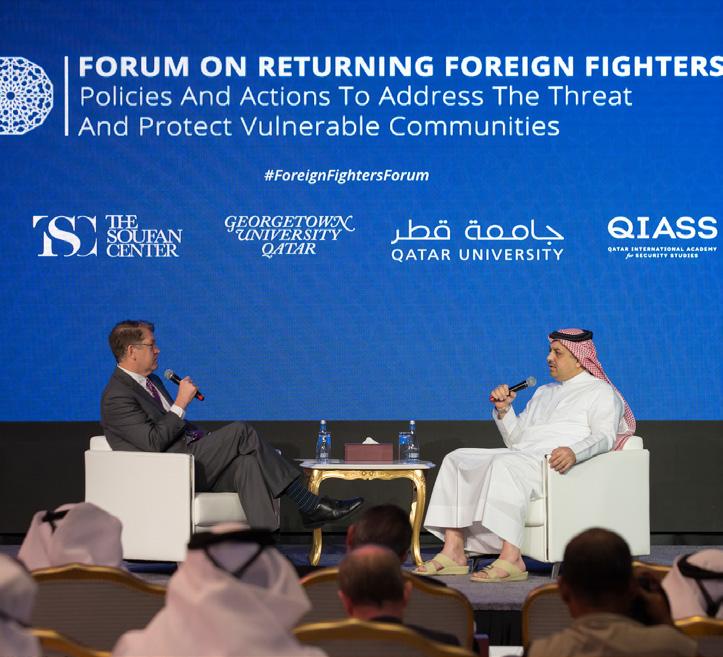
COLLABORATIVE CONFERENCES & COLLOQUIA
CHRISTIAN & MUSLIM PERSPECTIVES ON PALLIATIVE CARE & END OF LIFE
CO-ORGANIZERS:
GU-Q and the Vatican’s Pontifical Academy for Life The conference, opened by Dean Ahmed Dallal and the president of the Vatican’s Pontifical Academy for Life, Archbishop Vincenzo Paglia, initiated a multidisciplinary exchange on the issues surrounding the treatment of patients facing life-threatening illness and death. The conference focused on opportunities and barriers to care in Qatar and the region.
RETURNING FOREIGN FIGHTERS: POLICIES & ACTIONS TO ADDRESS THE THREAT & PROTECT VULNERABLE COMMUNITIES
CO-ORGANIZERS:
The Soufan Center, GU-Q, Qatar University, and the Qatar International Academy for Security Studies The Soufan Center brought together international experts, policy-makers, and intelligence and counterterrorism officials to address the challenges posed by returning foreign fighters. GU-Q’s Rory Miller and Gerd Nonneman were panel presenters, and later took part in the launch of The Gulf Crisis: The View from Qatar, edited by Rory Miller, and including contributions from multiple Education City researchers.
VISITING SCHOLARS Rajnaara Akhtar, De Montfort University (Scholar in Residence)
Karim El Taki, Cambridge University Naosuke Mukoyama, Oxford University Zhanar B. Abdikadyrova, Al-Farabi Kazakh National University
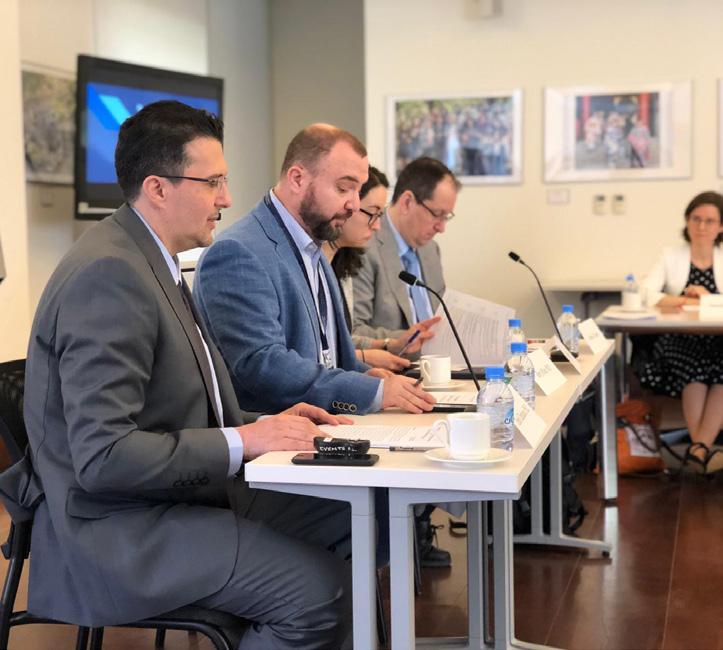
RE-IMAGINING REGIONAL SECURITY IN THE MIDDLE EAST
CO-SPONSORS:
The Gerda Henkel Foundation and GU-Q This GU-Q conference brought together leading academics and experts working in the fields of mass media, international relations, and security studies, for fruitful discussions on regional security topics.
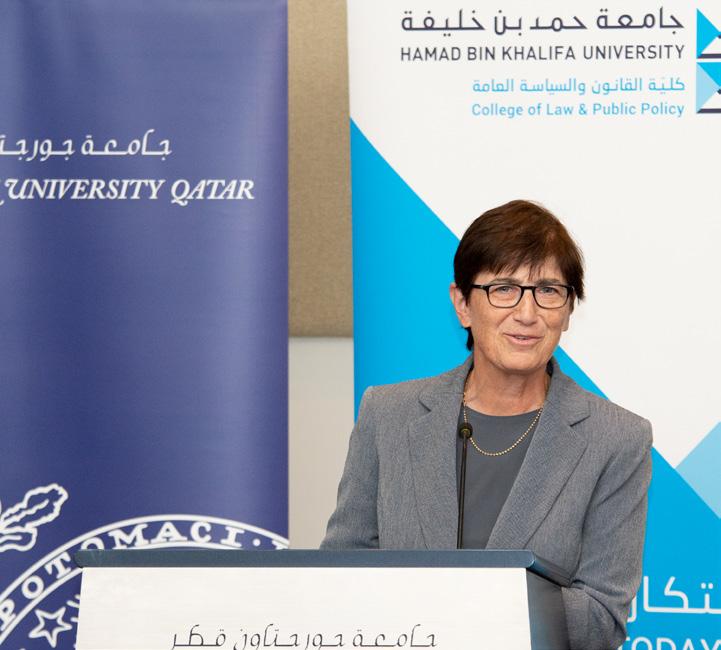
LEGAL & OTHER RESPONSES TO TARGETING POLITICAL KILLINGS
Susan Karamanian, Dean of CLPP, HBKU
CO-ORGANIZERS:
HBKU College of Law and Public Policy and GU-Q This colloquium explored the political underpinnings of targeted killings, and addressed the legal and other responses available to states to restrict and ultimately eliminate such events.
INSTITUTIONAL RESEARCH COLLABORATORS
• Cranfield University • Edmund D. Pellegrino Center for Clinical Bioethics, Georgetown University Medical Center • Georgetown University School of Foreign Service • Gerda Henkel Foundation • Graduate Institute of International and Development Studies, Geneva • Hamad Bin Khalifa University College of Law and Public Policy • Kennedy School of Ethics, Georgetown University • Northwestern University in Qatar • Pontifical Academy for Life, Vatican • Qatar International Academy for Security Studies • Qatar University • Soufan Center • University of Arizona • University of Bradford • Western Sydney University Aix-Marseille University
Akdemistanbul Language Center
American University of Beirut
American University of Central Asia, Kyrgyzstan
Ashghal Public Works Authority, Qatar
Ashoka University
Autonomous University of Madrid
Baylor University Binghamton University
Boston University
Bourse & Bazaar
British Library
Cambridge Muslim College
Columbia University
Cornell University
Doha Institute of Graduate Studies
Duke University
Durham University
Earlham School of Religion
R e s earch European University at St. Petersburg George Mason University Georgetown University
Hamad Bin Khalifa University
Hamad Medical Corporation
Hashemite University
Indian School of Business
QNRF GRANT PROJECTS
ISLAMIC BIOETHICS
NPRP 8-1478-6-053 9 peer-reviewed journal articles, 5 book chapters and an online encyclopedia have been written as a result of the Islamic Bioethics research project
Since initial funding in 2009, the Islamic Bioethics
Project, in coordination with the Kennedy Institute
of Ethics at Georgetown University, has organized scholarly meetings,
inspired academic activities, and received several other grants and awards through 2020. The project has been supported by grants from the National Priorities Research Program (NPRP) of the Qatar National Research Fund (QNRF). The most recent grant, “Structure of the Nuclear Family in the Wake of Genetic and Reproductive Technologies,” explores the impact of biomedical technology on Islamic family regulations. The project has contributed entries on 45 topics to the Oxford Islamic Studies Online portal
Though genetic and reproductive technologies have introduced solutions to many problems, they have equally raised challenging social, legal and ethical questions.
—Ayman Shabana, Associate Research Professor
2018-2019 OUTCOMES
FAMILY STRUCTURE IN THE WAKE OF GENETIC & REPRODUCTIVE TECHNOLOGIES CONFERENCE The twentieth century has witnessed many life-changing scientific and technological breakthroughs that touch almost all aspects of human life at the individual and collective levels.
In October 2018, scholars from across the humanities and social sciences gathered to discuss this critical topic, as well as religious and secular approaches to Islamic bioethics. Conference presenters included:
• Marcia Claire Inhorn, professor of medical anthropology, Yale University • Inmaculada de Melo-Martin, professor of medical ethics, Cornell University • Mohammad Fadel, shari’a law expert and associate professor, University of Toronto
New articles for the Encyclopedia of Islamic Bioethics are periodically published by the project on the Oxford Islamic Studies Online portal.
BOOK CHAPTERS Monroe, Kristin. 2019. “Muslims and Assisted Reproduction.” In Handbook of Contemporary Islam and Muslim Lives, edited by Mark Woodward and Ronald Lukens-Bull. Cham: Springer. 1-19.
Shabana, Ayman. 2019. “Transformation of the Concept of the Family in the Wake of Genomic Sequencing: An Islamic Perspective.” In Islamic Ethics and the Genome Question, edited by Mohammed Ghaly. Leiden: Brill. 80-110. A y m a n S h a b a n a
JOURNAL ARTICLE Serrano-Ruano, Delfina. 2018. “Redefining Paternal Filiation through DNA Testing: Law and the Children of Unmarried Mothers in the Maghreb.” Journal of Middle East Women’s Studies, 14 (3). 292-313.
LEGAL INNOVATION TO EMPOWER DEVELOPMENT: DESIGNING & BUILDING AN ONLINE “TRADELAB” IN QATAR
NPRP 7-1815-5-272
The Trade Lab project leverages internet technologies to broaden access to legal expertise on the World Trade Organization, free trade, and investment protection treaties, and their implementation in Qatar and the region. The three-year NPRP grant is helping to develop tradelab.org, and involves researchers from:
• Georgetown University • Georgetown University in Qatar • Graduate Institute of International and Development Studies in Geneva • Qatar University • University of Arizona
2018-2019 OUTCOMES
BOOK Pauwelyn, Joost and Mengyi Wang, eds. 2019. Building Legal Capacity for a More Inclusive Globalization. Geneva: The Graduate Institute.
JOURNAL ARTICLES Brummer, Chris, and Joost Pauwelyn, eds, 2018. Trade Lab Special Issue. Journal of International Review of Law, 2018 (1).
Pauwelyn, Joost and Weiwei Zhang, 2018. Busier than Ever? A Data-Driven Assessment and Forecast of WTO Caseload. Journal of International Economic Law, 21 (3). 461–487.
Pauwelyn, Joost. 2019. WTO Dispute Settlement Post 2019: What to Expect? Journal of International Economic Law, 22(3). 297–321.
Puig, Sergio. 2019. International Indigenous Economic Law. U.C. Davis Law Review, 52 (3). 1243-1316.
SAFE-Q
SAFEGUARDING FOOD & ENVIRONMENT IN QATAR (SAFE-Q)
NPRP 7-1103-5-156
The SAFE-Q research project is a three year collaborative investigation into how and why food is wasted in Qatar. Concluded this year, the NPRP project was funded by QNRF in 2015 and involved researchers from:
• Georgetown University in Qatar • Cranfield University • University of Bradford • Western Sydney University
2018-2019 OUTCOMES
JOURNAL ARTICLE Irani, Zahir et al. 2018. “Managing Food Security Through Food Waste and Loss: Small Data to Big Data.” Computers & Operations Research, 98. 367-383.
CONFERENCE PAPER Shamsul, Huda. “Methodology that Combined Structured Expert Judgement and Delphi Techniques.” Paper presented at the International Conference on Applied Analysis and Mathematical Modeling, Istanbul, Turkey, June 2018.
Istanbul S¸ ehir University
Jagiellonian University, Poland
KEDGE Business School
KIMEP University
King’s College London
Koç University
Leiden University
Massachusetts Institute of Technology
Max Planck Institute for Social Anthropology
Michigan State University
Middle Tennessee State University
Ministry of Education and Science, Kazakhstan
Moscow State Institute of International Relations
National Defense Academy, Austria
Nazarbayev University
Northwestern University in Qatar
Notre Dame University
R e s earch Nottingham Trent University Qatar Ministry of Public Health
∕ ANNUAL REPORT 2018-2019 31 Qatar University Real News Network Risk Advisory Group, U.K. Russian State University for the Humanities Rutgers University S. Rajaratnam School of International Studies Sabancı University
I n d i a n O c e a n W o r k i n g G r o u p
I n d i a n O c e a n W o r k i n g G r o u p
5th
annual Indian Ocean Research event hosted at GU-Q this year
43
maps on the Re-mapping Africa and the Indian Ocean website
COLLABORATIVE RESEARCH GROUPS
INDIAN OCEAN WORLD WORKING GROUP The Indian Ocean World working group meets regularly to discuss books, and plan conferences, symposia, and other events that promote research around connectivities in the Indian Ocean World. One of the group’s aims is to provide a “re-mapping” of the region through case studies that offer a variety of perspectives on circularities and identities forged in the wider Indian Ocean region. The working group features two major projects:
ANNUAL SY MPOSIUM The Indian Ocean World working group, including faculty from GU-Q, Qatar University, and Northwestern University in Qatar, fosters scholarly exchange and provides a research platform in Qatar.
Symposium 2018-2019 This year’s symposium, Towards a Re-Mapping of Diasporic Circularities in the Indian Ocean World, explored and redefined the diverse cultural, economic, and historical ties between countries in the Gulf region and Africa.
Featuring a panel of scholars from core team members and experts from institutions in India, Italy, the Netherlands, Portugal, South Africa, and the U.S., presenters explored the following issues through case studies from cities in Qatar, India, Madagascar, Tanzania, and others including:
• oil and wages • pre-modern histories • Islamic revivalism networks in the Malay-Indonesian world • the role of sheikhs as community builders • mobility, race, and slavery • interracial unions and colonial ethics • turn-of-the-century maritime military history
AL-FIRIJ Taken from the Qatari word for neighborhood, the Al-Firij website provides an opportunity for discussion and open exchange between faculty, students, and the wider community.
Join the Al-Firij conversation at http://firij.georgetown.domains/
Re-Mapping Africa and the Indian Ocean Created by members of the working group, the focus of Al-Firij is an interactive map-sharing platform that gives scholars the opportunity to share their research with others and hold open discussion about the subject.
Al-Firij provides a platform for additional research projects:
TRACING WAQF Tracing Waqf is a resource and manuscript sharing website, that aims to reshape the meaning of waqf to its original intention.
100+ WOMEN 100+ Women is a biography sharing website that features Arab women’s lived realities of the past and present.
CIRS WORKING GROUPS CIRS brings experts together to discuss relevant topics, hold meetings about potential research, and publish the results of those discussions. Each project typically holds two sessions, giving scholars the chance to present and receive feedback from their peers ahead of publication.
THE GCC CRISIS: QATAR & ITS NEIGHBORS Working Group I This project aims to better understand the causes of the dynamics at work through examining the social, political, and economic consequences of the ongoing crisis in the GCC—the land, maritime, and airspace blockade on Qatar that began in 2017.
HEALTHCARE ACCESS FOR SINGLE MALE LABORERS IN QATAR Working Group II CIRS brought together scholars and government entities to investigate single male laborers’ access to healthcare and formulate policy recommendations for improvements of the state of migrant health in Qatar.
INFORMAL POLITICS IN THE MIDDLE EAST Working Group II Since the Arab Spring there has been an increasing academic and policy interest in studying the role and influence of informal spaces where networks of activism might develop. This research focuses on the historical roots of such networks in the Middle East and their capacity for political engagement.
NATION BUILDING IN CENTRAL ASIA Working Group II This research examines how Central Asian states have navigated their early dilemmas, what their 30-year path towards nation building has been like, and what the consequences for particular strategies adopted for the different states have been.
POLITICAL ECONOMY OF THE CONTEMPORARY MIDDLE EAST Working Group I This working group explores a variety of topics, including globalization since 2011, post-uprising neoliberal policies, military-private sector relations, development policies, the shifting boundaries of economic integration, state bureaucracy, mechanisms and instruments of informal economies, and the dilemma of foreign direct investments.
RUSS IA & THE MIDDLE EAST Working Group I This research looks at Russia’s increasingly proactive and consequential involvement in the Middle East, including the drivers behind partnerships, economic cooperation, Islamic extremism and Russian foreign policy, and contemporary migration patterns.
SCIENCE & SCIENTIFIC PRODUCTION IN THE MIDDLE EAST Working Group I & II This research examines Islamic ethics and the legitimacy of scientific innovation in the Middle East by contrasting issues such as social inequality, the role of women, economic policies, the military-industrial complex, consumerism, and sanctions with scientific production in the Arab World.
San Diego State University
Sapienza University of Rome
Save the Children
School of Oriental and African Studies
Paris Institute of Political Studies (Sciences Po)
Southeastern University of Sri Lanka
Towson University
Turkish Radio and Television Corporation (TRT) Research Center
University College London
University of Bonn
University of California, Los Angeles
University of Cambridge
University of Chicago
University of Exeter
University of Jyvaskyla
University of Kashmir
University of Lille
University of Manchester
University of Manouba
R e s earch University of Massachusetts-Amherst University of Michigan
University of Milan
University of Oregon
University of Oxford
University of Peshawar
University of Pretoria
University of Tartu
University of Tübingen
CIRS SUPPORT FOR FACULTY CIRS provides a number of research opportunities for faculty at GU-Q, including fellowship opportunities, engagement with international scholars, publication workshops, lectures, discussions, and grants for original fieldwork on issues related to the Gulf, the Middle East, and Asia. Activities include dissemination of faculty research, and inviting top scholars to GU-Q to further develop research in relevant fields.
CENTER FOR INTERNATIONAL & REGIONAL STUDIES (CIRS) CIRS is devoted to the academic study of regional and international issues through dialogue and the exchange of ideas, research, and scholarship. The center also facilitates engagement with national and international scholars, opinion-makers, practitioners, and activists.
EACH YEAR, CIRS… SPONSORS RESEARCH INITIATIVES CIRS sponsors research initiatives on topics including international relations, political economy, and regional politics. Initiatives are typically sponsored for 18–24 months. Initiatives involve up to 20 scholars
SUPPORTS LOCAL SCHOLARSHIP CIRS Faculty Fellowships are offered annually to GU-Q and Qatar University faculty who present their research and engage with students and faculty.
PROMOTES STUDENT RESEARCH CIRS supports student scholarship through the CIRS Undergraduate Research Advancement (CURA) program and by offering student participation in faculty-fellow research workshops, publications, and other research activities.
ORGANIZES COMMUNITY ENGAGEMENT CIRS has welcomed more than 15,000 members of the community to public events since it was founded in 2007.
FACULTY FELLOWSHIPS CIRS annually awards a Faculty Fellowship to one faculty member from GU-Q and one from Qatar University to encourage original research. Fellows are invited to present their research at a lecture sponsored by CIRS. Faculty Fellows for 2018-2019 were:
• Phoebe Musandu, GU-Q • Alanoud Al-Maadeed, Qatar University
FACULTY LECTURES CIRS invites faculty from GU-Q to deliver a variety of public lectures in the form of dialogues and focused discussions for the wider community in Qatar. The work of GU-Q faculty members is often featured at CIRS community outreach events.
CIRS also contributed to the research environment by hosting seven scholars from local institutions, including:
• Qatar University • Doha Institute for Graduate Studies • National Defense University • VCUarts Qatar • Al Jazeera
Phoebe Musandu was one of four faculty members featured at CIRS community outreach events this academic year
FOCUSED DISCUSS IONS CIRS Focused Discussions provide an intellectual forum for academics, artists, diplomats, and opinion leaders to engage with students and the public on topics of interest. This year, the series included:
14
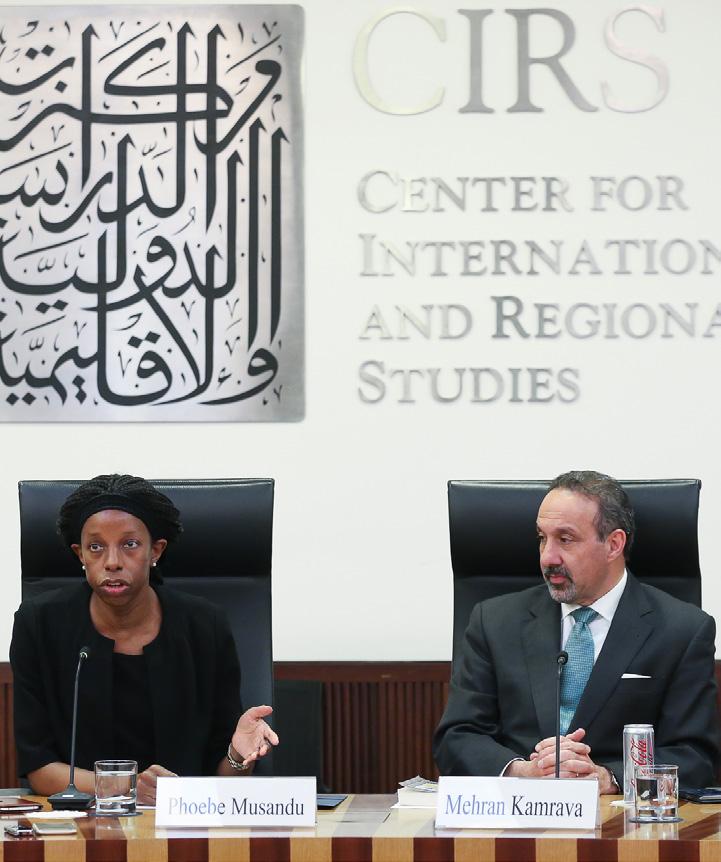
Abdelwahab El-Affendi
CIRS Faculty Fellowships 2012−2019: 7 to GU-Q faculty and 7 to Qatar University faculty
Access Denied: Banning Qatari Ships from Blockading States Muna Al-Marzouqi, Qatar University
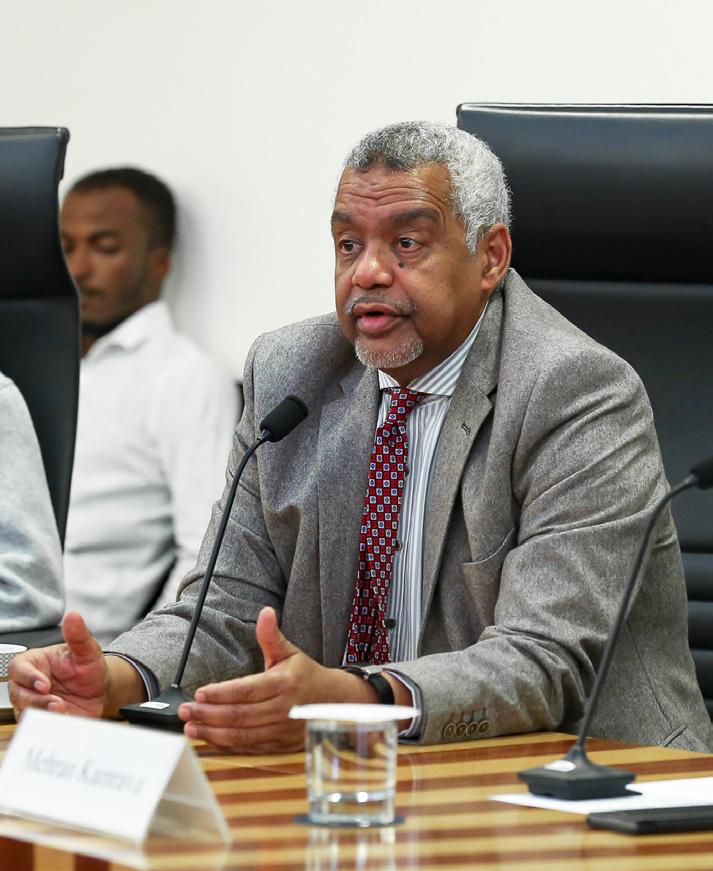
Fundamentalist Metamorphosis: Hezbollah’s Ideological Evolution from Idealism to Pragmatism Massaab Al-Aloosy, Al Jazeera Network
Prospects for a Peaceful Democratic Transition in Sudan Abdelwahab El-Affendi, Doha Institute for Graduate Studies
“Serve... As Best We Can:” A Local East African Newspaper vs. the State and Market Forces Phoebe Musandu, GU-Q
Taking Measure of U.S. Foreign Policy Richard L. Russell, National Defense University
The Impact of Business and Political News on the GCC Stock Market Alanoud Al-Maadeed, Qatar University
Western Higher Education in Global Contexts Mohana Rajakumar, VCUarts Qatar
FACULTY PUBLICATION WORKSHOPS CIRS faculty publication workshops bring together scholars and experts in a particular field to critique a manuscript authored by a GU-Q faculty member. This year, Firat Oruc’s manuscript “Postmodernity and Film: A Cultural History of the Moving Image in the Arabian Peninsula” was the subject of a one-day workshop.
DIALOGUE SERIES BOOK LAUNCHES Kamrava, Mehran. 2018. Troubled Waters: Insecurity in the Persian Gulf. Cornell University Press.
Verhoeven, Harry. ed. 2018. Environmental Politics in the Middle East. Hurst.
56
lectures and talks involving GU-Q faculty members hosted by CIRS between 2007 and 2019
41 +
original research initiatives launched by CIRS between 2007 and 2019
2018-2019 FACULTY RESEARCH GRANTS BY SPECIALIZATION
Anthropology & Sociology ...................................................................................................... 2 Arabic Education.................................................................................................................... 7 Economics ............................................................................................................................. 4 History................................................................................................................................... 7 Law ....................................................................................................................................... 3 Literature............................................................................................................................... 3 Media .................................................................................................................................... 3 Politics .................................................................................................................................. 8 Religious Studies & Ethics ..................................................................................................... 4
Rogaia Abusharaf
Alexis Antoniades
ANTHROPOLOGY & SOCIOLOGY Rogaia Abusharaf: Omani-Zanzibari Identity at the Intersection of Political Violence and Forced Migration.
ECONOMICS Alexis Antoniades: Price Dispersion Across Regions, Retailers, and Countries: Comparing the UAE, Qatar, Oman, Saudi Arabia, Kuwait, and Bahrain.
Mongolijn Batsaikhan: Gender Inequity, Social Capital, Economics, and Discrimination in Developing Countries.
ARABIC EDUCATION Mahmoud Al-Ashiri: Towards a Word List of the Most Frequent Words of Standard Arabic Heard by Arab Children in an Annotated Corpus.
Abbas Al-Tonsi: From Reading to Writing.
Abdul Rahman Chamseddine: Handbook for Formal Spoken Arabic.
Hany Fazza: Employers’ Perceptions and Expectations of the GU-Q Arabic Language Graduates.
Yehia Mohamed: Analysis of Heritage Language Learner Error in Written Arabic.
Hana Zabarah: Arabic as a Heritage Language in the U.S.; Arabic Grammatical Textbooks in the Islamic Middle Ages. Jose Asturias: The Collapse of Internal Trade During the Great Recession: The Case of Spain.
Jack Rossbach: Understanding International and Regional Trade Dynamics.
Karl Widerquist: Basic Income: Essential Knowledge.
HISTORY M. Reza Pirbhai: Indo-Arabia: The History of a Lost Region; An Autobiography of Pakistan.
Max Oidtmann: Qing Colonialism and the History of Tibetan Law.
James Reardon-Anderson: A History of Qatar and the Arabian Gulf in the 19th Century.
Amira Sonbol: Tying the Knot: History of Marriage in Islam.
Karine Walther: American Christians for Palestine/Spreading the Faith: American Missionaries, Aramco, and the Birth of the U.S.-Saudi Special Relationship, 1889-1953.
Karl Widerquist: The Prehistory of Private Property.
LAW Edward Kolla: History of the Passport and Change in International Law.
POLITICS Sonia Alonso: Responsiveness vs. Representation in Democracies: The Mainstream Right in Spain.
Uday Chandra: Religious Nationalism, Populism, and Democracy in India.
Amanda Garett: Political Opportunism and “Racially” Coded Campaigns: How the European Refugee Crisis Impacts the Right’s Anti-Immigrant Message in the U.K. and Germany.
Ayman Shabana: Legal Status of Medical Treatment.
Sohaira Siddiqui: Rise, Reformulations and Resistance: Anglo-Muhammadan Law.
LITERATURE Ian Almond: Decentering World Literature: Mexico, Turkey, and Bengal.
Amira El-Zein: A Tribute to the Work of the Arab American Writer and Artist, Etel Adnan.
Omar Khalifa: The Kanafani Plot: Staging the Palestinians’ Return in Contemporary Palestinian Literature.
MEDIA Phoebe Musandu: The Business and Politics of a Postcolonial East African Print Media Sector: 1960-1990.
Firat Oruc: Cinema and Visual Representation in the Arabian Peninsula.
Mohamed Zayani: The Middle East’s Evolving Information Ecosystem. Mehran Kamrava: Righteous Politics: Power and Legitimacy in Iran.
Anatol Lieven: Climate Change and the Nation State: An Alliance for the Future.
Rory Miller: The Last Temptation: External Intervention in Palestine.
Harry Verhoeven: Africa’s Illiberal State Builders.
Clyde Wilcox: Research into Millennial Political Attitudes.
RELIGIOUS STUDIES & ETHICS Akintunde Akinade: Engaging Pentecostal Power in Africa and in the Diaspora.
Abdullah Al-Arian: Islamism/ Nationalism Project; American Muslims Project.
Jeremy Koons: The Ethics of Wilfrid Sellars.
Patrick Laude: Studies on Ramana Maharshi, 1879-1950.
Akintunde Akinade
Karine Walther
Rory Miller R e s earch










